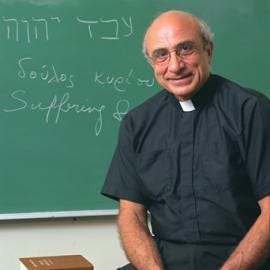My Biblical Hebrew teacher, the Very Reverend Father Paul Nadim Tarazi, keeps saying that he will retire for good on his upcoming 80th birthday on Oct. 3, 2023. I remember when he retired from St. Vladimir’s Orthodox Theological Seminary, back in 2014, after teaching my friend Gabriel Biblical Hebrew 1-on-1 for a semester. Let’s see if he follows through this time. He also released Decoding Genesis, after saying Rise of Scripture would be his final book. I’m not complaining. I enjoy his content.
He says that biblical joy and happiness are what you have when things are as they should be. When you have שלום (shalom). Which is not just peace in the sense of lack of war, an idea you may find in the Iliad, alongside the need for war to ensure peace.
The job of a teacher in the Orthodox Church is to present the text of Scripture to the rest of the body of Christ in a way that they can understand and grasp the words (instructions and commands) in their original context. It would be unwise to expect all of the people to learn Biblical Hebrew, but that would be great. Instead, at least, the teachers should make some effort to learn Biblical Hebrew, and maybe Arabic and Ugaritic.
Here are two Biblical Hebrew words: משל (mashal) and שפט (shapat/shaphat/shafat). In Ge’ez they would be originally written ማሣል and ሣፋት, and in later Amharic understanding of the Ge’ez alphabet as, ማሻል and ሻፋት. The corresponding cognates are ምሳሌ (misalé) & መሥፍን (mesfin). A mashal is a parable, an allegory, a fable, an illustrative example etc.
and the word of yahweh came to me, saying, son of the groundling, riddle a riddle, and parable a parable to the house of those who grapple with god (Ezekiel 17:1,2)
The illustrious NKJV has “pose a riddle, and speak a parable”. See what your preferred version (English or otherwise) says, and get back to me. በዐምሐርኛ it should be ምሳሌን መስልና እንቈቅልሽን እንቈቍል። The Biblical Hebrew uses the same root word for noun and verb, which is why I rendered it as close to the original as I could in my translation above. Using the same root word back-to-back is a way of ancient emphasis in the text, prior to the age of highlighter markers and emojis.
Looking at Biblical Hebrew’s 2nd cousins Ge’ez, which has no p except for foreign words, and Arabic which had no p letter but had vocalizing dots added recently to accommodate foreign words, I asked him about the middle letter in the three-letter Biblical Hebrew word shafat, and received no definitive answer, but just to recognize either consonant (p or f) in connection with the definition of judgment as discernment of a complex issue versus deen which is a judgment which is more powerful because it expresses the action of omitting a judgment against someone. Obliterating a debt or penalty.
In Ge’ez and Amharic, we have mesfin (singular) and mesafint (plural) as referents to the hereditary chiefs, princes, leaders, rulers, or judges. Also, common names for men. The biblical Book of Judges is called መጽሐፈ መሣፍንት (metshafe mesafint). The period of Ethiopian history from ~1769 A.D. – 1855 A.D. is referred to as ዘመነ መሣፍንት (zemene mesafint); a weakening of centralized power in favor of decentralized local hereditary and nonhereditary rulers retaining true power, as a cycle of puppet emperors sat on the main throne. Emperor téwodros II famously broke the cycle, by beating the shit out of everyone until he was recognized as King of Kings of Ethiopia, thereby ‘creating’ the modern nation-state of Ethiopia later consolidated by Emperor mineelik II. Choirmaster tsehay birhanu, a pioneer of modern mezmur in Amharic, sings ሠፈነ ሰላም (sefene selam) meaning that peace reigns and rules in the New Testament time of our Lord Jesus Christ.
All I know about Ugaritic is 1) an insight from their culture about a goat demon ritual that explains why today’s Jews do not eat meat and cheese together, that I picked up from the late great Dr. Michael Heiser and 2) Fr. Paul’s insistence that we read the three-volume Psalms commentary that consults Ugaritic by Fr. Mitchell Dahood.
On Arabic, he mentioned a few things today, but one that stuck with me is how the Biblical Hebrew word חכמה (khakmah/5akmah) is a cognate of the Arabic and Amharic hakeem or wise man which is used for physician or medical doctor. An important distinction is that this is from the spoken variety of both langages. Literary Arabic has instead طبيب (Tabeeb) which sounds like Ge’ez and Amharic ጠቢብ (Tebeeb) or wise man, whereas literary Amharic uses ባለ መድኃኒት (bale medhaneet) for physician.
There are so many connections. Keep studying.


